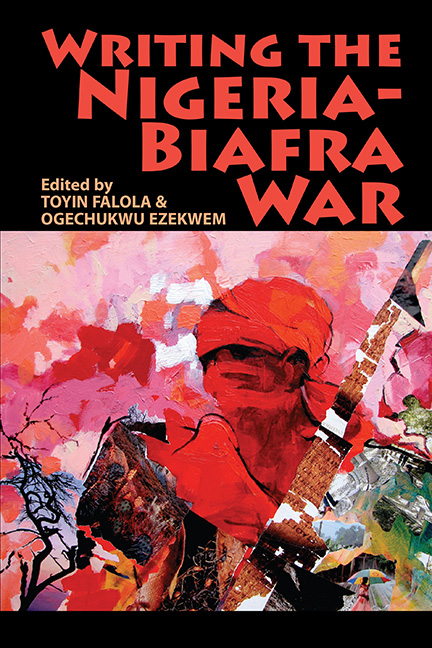Book contents
- Frontmatter
- Contents
- Notes on Contributors
- List of Abbreviations
- Timeline
- Map of Biafra 30 May 1967 – 1 May 1969
- 1 Scholarly Trends, Issues, and Themes: Introduction
- Part I On The History Of The Nigeria-Biafra War
- Part II Critical Debates On The Nigerian Crisis
- Part III The War In Fiction, Memoir, And Imagination
- Part IV Locating Gender In Nigeria-Biafra War Literature
- Select Bibliography
- Index
1 - Scholarly Trends, Issues, and Themes: Introduction
Published online by Cambridge University Press: 17 June 2021
- Frontmatter
- Contents
- Notes on Contributors
- List of Abbreviations
- Timeline
- Map of Biafra 30 May 1967 – 1 May 1969
- 1 Scholarly Trends, Issues, and Themes: Introduction
- Part I On The History Of The Nigeria-Biafra War
- Part II Critical Debates On The Nigerian Crisis
- Part III The War In Fiction, Memoir, And Imagination
- Part IV Locating Gender In Nigeria-Biafra War Literature
- Select Bibliography
- Index
Summary
An Intellectual History?
The central premise of intellectual history is that ideas do not exist in isolation but are shaped by the lives and outlooks of the people who created them as well as the cultural, social, political, and historical contexts in which they were produced. It is not just a study of intellectuals but of their opinions and the specific time and space that influenced their views. Its distinctiveness lies in the aspect of the past that it aims to illuminate, rather than the possession of any exclusive evidence. For the purposes of this book, we examine specific authors as well as particular themes and trajectories in the Nigeria-Biafra literature. Civil wars are prime candidates for intellectual analyses because they are in themselves contentious and cannot be abstracted from their historical setting. They also resist reifications and extend into technical discourses and non-expert exchanges. Analysing the Nigeria-Biafra war literature within the parameters of its social, political, and cultural contexts provide insight into the bases of the strife that plague this historical event and its consequent body of knowledge.
The Nigeria-Biafra War, which lasted from 1967 to 1970, has remained a divisive issue in Nigeria and in scholarly circles. There is a plethora of literature on the war; yet, no book has comprehensively analysed the nature, background, and sentiments that shaped the construction of these often contentious texts. This kind of analysis is especially crucial because war literatures are shaped by various experiences, group affiliations, and biases. In chronicling warfare, writers, historians, chroniclers, combatants, and victims, among others, are confronted with making sense of war, the shades of violence associated with it, and the overall consequences.
The literatures also deal with the problem of apportioning blame, giving voice to trauma, and evaluating the war's overall impact. There is also the difficult issue of trauma and memory, which shape narratives of war-related experiences. Many cultures and individuals who experienced traumatic events during wartime suppress these memories in their efforts to cope. Writers are, thus, not only faced with these silences but also the physical impact on their subjects who relive their experiences in the process of recounting it. Then, there is the problem of data analysis. There are those silences or manipulations that result from the inclination to bend stories to suit the agendas of government and other political groups.
- Type
- Chapter
- Information
- Writing the Nigeria-Biafra War , pp. 1 - 14Publisher: Boydell & BrewerPrint publication year: 2016

